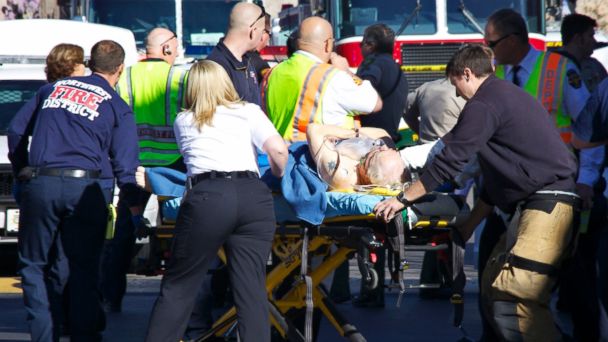After Ft. Hood, Rep. Ron Barber Opens Up About Tucson Shooting

(James Palka/Getty Images)
When shots rang out on April 2 at the Fort Hood military post in Texas, Rep. Ron Barber, D-Ariz., couldn't help but remember his own experience with gun violence.
"That takes me back to the day that the shooting occurred in Tucson back in January of 2011," Barber told ABC News in a recent interview. "I know from talking to my family afterwards how shocking and just scary that first phone call was."
Barber at the time was the district director to Rep. Gabby Giffords. He was shot twice when Jared Loughner opened fire in Tucson on Jan. 8, 2011. Loughner killed six and nearly took the life of Giffords, who he shot in the head. Barber was wounded in the cheek and leg.
Barber succeeded Giffords after the congresswoman resigned in 2012 and he is currently in a tough re-election fight with a formidable Republican challenger. The most recent race ratings released by The Rothenberg Political Report and The Cook Political Report last week list the race as a toss-up.
Although Barber has been working on gun violence legislation since taking office, he has not spoken out frequently about his personal experience with the shooting. During his two previous congressional bids - first for Giffords' seat in 2012 and in a race for the re-districted 2nd Congressional District five months later, he spoke little of the shooting.
"I made a decision very early on that I wasn't going to make it a centerpiece or even a piece of the election or campaign," he said. "I really felt that I wanted to present myself to the community as someone who I thought would be able to do the job and that was competent and had experience and depth, some roots in the community that would be helpful to serve the community, as I'm now doing."
The closest he came was in his last campaign ad for the 2nd district seat, which opened with a quote from Tucson Weekly stating "After nearly losing his life…Ron Barber demonstrated his resilience."
Recently, however, that's changed. Barber has recounted his experience publicly, most recently in an Op-Ed in The Hill newspaper and at the White House ceremony honoring fellow Tucson shooting survivor Pam Simon for her efforts to reduce gun violence.
"Sandy Hook was the tipping point for me, and I think millions of Americans, when we saw what happened," Barber said. "Twenty really beautiful young kids who were just massacred and… I couldn't believe it."
Barber said his work on gun violence prevention started in the hospital after the Tucson shooting. By the time he arrived in Washington Barber immediately got to work on a Mental Health First Aid bill to help raise public awareness about mental illness. The program, which provides mental health training services to teachers, students, police, firemen and other citizens, received $15 million in funding from a provision in an omnibus spending bill in January.
"I think it has a lot of potential across the country to help get out in front of these tragedies, [because] the truth of the matter is that because of stigma and because people aren't really aware of what mental health symptoms look like, a lot of things get missed," Barber said.
Accused Fort Hood shooter Ivan Lopez had a history of psychological issues and was being evaluated for possible PTSD which Lopez claimed he had.
In March Barber took a congressional trip to visit troops in Afghanistan, and even as the war has drawn to an end he said the experience allowed him to see first-hand the magnitude of stress the war has put on U.S. troops.
"Unfortunately we are seeing all too many people who have fought in Afghanistan and Iraq coming back with very serious mental health issues such as PTSD, and we are not, I believe, prepared to help treat them or deliver the services they need," Barber stated.
Barber said using the lessons learned about mental health and guns in Tucson, Sandy Hook and Fort Hood can help avert future situations.
"If we do early identification we do early diagnosis and treatment, many of these tragedies could be averted," he said. "I believe that would be the case in the man that shot us, if he had gotten treatment I think we could have potentially avoided that terrible day."
The congressman said the other part of preventing gun violence is finding a way to make sure those prohibited from buying guns go through a background check, and called on Congress to end the background check "loophole" that allows people to purchase firearms over the internet and at gun shows without checks.
"People who want to buy a gun without having a background check can do so [at gun shows or online], and I think that's an issue we need to resolve," he said.
The Arizona congressman is facing one of the toughest reelection races this midterm election season against his former Republican opponent, retired Air Force Colonel Martha McSally, whom he narrowly beat in 2012. Although McSally still has to win the August primary, she is the clear Republican front-runner, enjoying the support of big spending powers like Americans for Prosperity and the National Republican Congressional Committee.
McSally's position on gun violence prevention mirrors Barber's emphasis on mental health, but rejects his calls for background checks.
McSally's deputy campaign manager, Kristen Douglas, said in a statement that McSally is "pro Second Amendment and believes our focus for preventing shootings should be on strengthening our mental health system and enforcing background check laws already on the books, not expanding those laws that will do little to prevent violence and infringe on the rights of law abiding citizens."
"I'm a very strong supporter of the Second Amendment, and I believe that people have a right to own a firearm," Barber stated, stressing that his goal is preventing gun violence, not pushing all gun control initiatives.